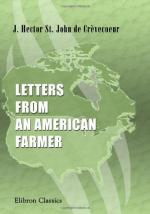their economy being very great in that respect.
These are commonly called Tetoukemah lots. You
must not imagine that every person on the island is
either a landholder, or concerned in rural operations;
no, the greater part are at sea; busily employed in
their different fisheries; others are mere strangers,
who come to settle as handicrafts, mechanics, etc.,
and even among the natives few are possessed of determinate
shares of land: for engaged in sea affairs, or
trade, they are satisfied with possessing a few sheep
pastures, by means of which they may have perhaps
one or two cows. Many have but one, for the great
number of children they have, has caused such sub-divisions
of the original proprietorship as is sometimes puzzling
to trace; and several of the most fortunate at sea,
have purchased and realised a great number of these
original pasture titles. The best land on the
island is at Palpus, remarkable for nothing but a
house of entertainment. Quayes is a small but
valuable track, long since purchased by Mr. Coffin,
where he has erected the best house on the island.
By long attention, proximity of the sea, etc.,
this fertile spot has been well manured, and is now
the garden of Nantucket. Adjoining to it on the
west side there is a small stream, on which they have
erected a fulling mill; on the east is the lot, known
by the name of Squam, watered likewise by a small
rivulet, on which stands another fulling mill.
Here is fine loamy soil, producing excellent clover,
which is mowed twice a year. These mills prepare
all the cloth which is made here: you may easily
suppose that having so large a flock of sheep, they
abound in wool; part of this they export, and the rest
is spun by their industrious wives and converted into
substantial garments. To the south-east is a
great division of the island, fenced by itself, known
by the name of Siasconcet lot. It is a very uneven
track of ground, abounding with swamps; here they turn
in their fat cattle, or such as they intend to stall-feed,
for their winter’s provisions. It is on
the shores of this part of the island, near Pochick
Rip, where they catch their best fish, such as sea
bass, tew-tag, or black fish, cod, smelt, perch, shadine,
pike, etc. They have erected a few fishing
houses on this shore, as well as at Sankate’s
Head, and Suffakatche Beach, where the fishermen dwell
in the fishing season. Many red cedar bushes
and beach grass grow on the peninsula of Coitou; the
soil is light and sandy, and serves as a receptacle
for rabbits. It is here that their sheep find
shelter in the snow storms of the winter. At
the north end of Nantucket, there is a long point
of land, projecting far into the sea, called Sandy
Point; nothing grows on it but plain grass; and this
is the place from whence they often catch porpoises
and sharks, by a very ingenious method. On this
point they commonly drive their horses in the spring
of the year, in order to feed on the grass it bears,
which is useless when arrived at maturity. Between




